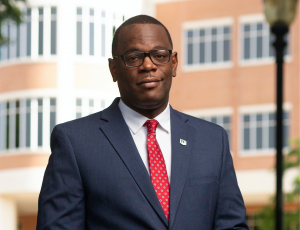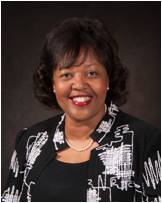JACKSON – During the 2022 National HBCU Week Conference in Washington, D.C., held in September, a consortium of HBCUs and other minority-serving institutions were formally congratulated after earning a $15 million grant from the National Science Foundation (NSF) to help minority-serving institutions close the digital divide in cyberinfrastructure research.
For the special announcement, Jackson State University (JSU) President Thomas K. Hudson and Deborah Dent, Ph.D., chief information officer and one of the grant’s co-principal investigators, were joined by other HBCU leaders as they discussed training efforts to advance cyberinfrastructure. The Minority Serving-Cyberinfrastructure Consortium (MS-CC) and Internet2 applauded the news of their shared grant. JSU is a part of MS-CC, along with Hispanic-serving institutions (HSI), tribal colleges and universities (TCU), and other minority-serving institutions (MSI).
 “We’re excited to participate in this grant with the National Science Foundation, which aligns so well with Jackson State’s strategic plan to increase and diversify its research portfolio,” said President Hudson. “The grant will help enhance our relevant STEM curricular offerings and training at the graduate and undergraduate levels, and expand our research infrastructure.”
“We’re excited to participate in this grant with the National Science Foundation, which aligns so well with Jackson State’s strategic plan to increase and diversify its research portfolio,” said President Hudson. “The grant will help enhance our relevant STEM curricular offerings and training at the graduate and undergraduate levels, and expand our research infrastructure.”
The NSF grant is expected to provide HBCU and TCU institutions with campus-specific cyberinfrastructure assessments that foster cyberinfrastructure strategic plans.
Dent said the grant will provide invaluable resources to Mississippi’s only urban HBCU.
“Cyberinfrastructure merges technology, data, and human resources into a seamless whole, so the MS-CC envisions a transformational partnership on HBCU and other minority-serving campuses,” said Dent.
The MS-CC will coordinate and deploy three shared support teams focused on cyberinfrastructure, stakeholder alignment, and research and education. The teams will work throughout the MS-CC ecosystem to identify and execute strategic cyberinfrastructure investments at HBCUs, TCUs and other under-resourced institutions.
 Over the course of the five-year grant (NSF OAC # 2234326), MS-CC and Internet2 will facilitate proof-of-concept grants for several HBCUs and TCUs. Those awards will fund key cyberinfrastructure technology investments to address barriers they’ve encountered when developing research or applying for cyberinfrastructure funding. A key component of the proof-of-concept grants is to facilitate and build technology capabilities for those receiving them.
Over the course of the five-year grant (NSF OAC # 2234326), MS-CC and Internet2 will facilitate proof-of-concept grants for several HBCUs and TCUs. Those awards will fund key cyberinfrastructure technology investments to address barriers they’ve encountered when developing research or applying for cyberinfrastructure funding. A key component of the proof-of-concept grants is to facilitate and build technology capabilities for those receiving them.
While hailing the prospect of future collaborations and capacity-building connections, Dent cites JSU’s immediate needs: cyberinfrastructure network engineers who require a different skill set than enterprise network engineers; faculty for cyberinfrastructure training; and workforce development.
Ana Hunsinger, vice president of community engagement at Internet2, said the grant signals a recognition that the MS-CC is a change agent that can support the 21st-century digital STEM workforce.
“The MS-CC is committed to its vision of establishing itself as a community-owned, collaborative and connective effort focused on advancing cyberinfrastructure at HBCUs, TCUs and other MSIs,” she said. “We are working to broaden participation by underrepresented groups in STEM fields within the U.S. research cyberinfrastructure ecosystem and enabling new perspectives and voices to be included in national and global research projects.”
Internet2 is a nonprofit, member-driven advanced technology consortium. It provides national and global technology infrastructure and collaboration capabilities for the nation’s researchers, scholars and learners. It has been working with leadership from the MS-CC since 2019 to ensure equal participation in the U.S. and global research and education communities.
In the past, there have been numerous hurdles for minority-serving institutions because significant research grant opportunities often assume they already have cyberinfrastructure resources in place. Because that wasn’t the case for most of them, they were denied. Adding to JSU’s challenge is the fact that general state funds do not cover funding for research cyberinfrastructure. Consequently, minority-serving institutions have suffered from a lack of high-speed networks, cyberinfrastructure personnel and dedicated facilities.
Fortunately, that is changing as the NSF and other funding agencies acknowledge the deficiency and inequity by responding accordingly.
Ultimately, JSU’s cyberinfrastructure improvements would result in high-performance and cloud computing capabilities to support and bolster research areas, including big data scientific analytics and health science. Dent also foresees expansion in artificial intelligence (AI), machine learning (ML) and cybersecurity.
On a larger scale, she said JSU could be part of the solution to “The Missing Millions.” It’s a phrase by the NSF and the National Science Board to describe the “considerable gaps” in software and data capabilities throughout the U.S. and insufficient diversity in the support and use of cyberinfrastructure.
Dent is optimistic that change is coming, and she touts the importance of investing in human resources. “Including HBCUs, HSIs, TCUs and other minority-serving institutions in the cyberinfrastructure ecosystem will pay huge dividends locally and globally by addressing the gaps in the STEM workforce,” she said.
The other co-principal investigators are James Brenn, associate vice president for information technology at Claflin University in South Carolina; and Al Anderson, chief information officer at Salish Kootenai College in Pablo, Montana.
# # #






